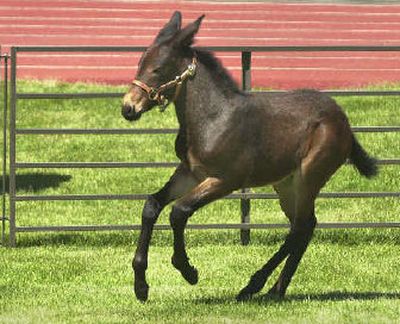Mule cloned at UI outruns competition

MOSCOW, Idaho – If the proving ground for new inventions is competition, then a mule cloned at the University of Idaho has scored a big victory for his kind.
Idaho Gem outran six mules to win a 350-yard race Wednesday at the San Joaquin County Fair, finishing in 20.724 seconds and beating Bar JF Rock On, the favorite.
“When you have animals compete successfully, it shows you have healthy animals,” Gordon Woods, a UI professor and lead scientist in the cloning project, told the Lewiston Tribune.
It was Idaho Gem’s second finals race, not counting qualifying heats. The world’s first equine clone finished third in the finals of an eight-mule race earlier this month in Nevada.
Idaho Gem’s brother, Idaho Star, scratched in Wednesday’s race after being kicked by a horse and then bucking his jockey on the way to the starting gate. In the earlier race, Idaho Star was seventh.
“They have the same athletic abilities, but two different personalities,” said Don Jacklin, who leases Idaho Gem for racing and is the president of the American Mule Racing Association.
The brothers were born three years ago and carry identical DNA taken from a fetus produced by the same parents that produced a champion mule racer. A mule is the usually sterile offspring of a donkey father and a horse mother.
A third mule clone called Utah Pioneer is being trained as a saddle mule.
UI researchers are looking for more than just race results from the clones. Horses and other equines have significantly lower cancer rates than humans, and scientists hope cloning will illuminate the difference and provide research clues, particularly into calcium’s role in the disease. Equines have much less calcium within cell walls than humans.
“Along with the serious side of science, there was a lot of drama,” Woods said.
He predicts the clones will get faster.
“At the University of Idaho we spoiled these animals rotten,” he said. “The longer they get away from their spoiled management, and the longer they’re in training, the better they’ll get.”
While Idaho Star hasn’t yet posted the top results of his brother, the person who leases and races him remained upbeat.
“It was an enormously impressive outing for a 3-year-old,” said Roger Downey.
The California horse racing board has requested chip implants in each of the clones. The implants are scanned before a race to avoid confusion about their identities.
While science drives the cloning project, researchers have discovered that race fans like winners.
“People get hands-on and close to these animals,” said Ken White, a scientist from Utah State University who was on the cloning team. “That they’re doing so well is further justification and verification that animals are healthy and strong and cloning doesn’t impede this.”